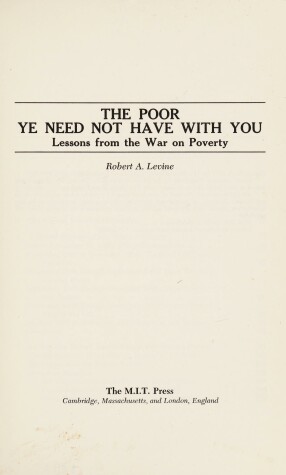The best description of this sharp-witted, lively commentary is the book itself."The Politics of Provocation is the style of a petulant child.... It is forming opinions on the basis of "whom" we might like or dislike rather than "what" might or might not work.... If we don't like the poor, we get even with them. If we don't like the Pentagon, we get even with it. Then we feel better because we have shown someone how angry we are...."The Problem-Solving style is the reverse of this.... It is the rule of reason in politics. It is the rule that leads us to weigh what we are doing or advocating according to the effects it has rather than how it makes us feel...."The point is that by continuing in this direction of solving the problems of discriminatory behavior we can make progress far faster than we can against the attitudes that cause it. Anti-Semitic behavior has long since ceased to be a problem for American Jews in spite of the fact that anti-Semitic attitudes persist...."As for the welfare system, "the Politics of Provocation dictates that it is more important to catch that last sinner than to start doing away with the whole bloody thing."The Problem-Solving style can cut through this mess. It would dictate a simple system of income support, a national system of income support, a noninvestigatory system of income support, and most important, a system that would increase the incentive to work rather than trying to force people to work regardless of the consequence, a system that would encourage families to stay together instead of encouraging them to break up.....".".exhortation will not make discrimination go away, nor will a mass examination of individual consciences. That is why the 'white racism' accusation of the Kerner Report, although true, is irrelevant at least as it has been interpreted. The problem-solving style dictates that doing something about ending discrimination and segregation means not just talking about them but having programs that attack them in detail......".The ordinary answer to an accusation of discrimination is increasingly becoming 'Who, me?' and it is meant sincerely. What will really be hard to give up, however, are habitual patterns that lead to discrimination without that intention: the pattern of the man who honestly doesn't mind living in an integrated neighborhood but doesn't want property values lowered; the pattern of the man who honestly doesn't mind working in an integrated situation but doesn't want seniority bent; the pattern of the man who honestly wants to see people of all races in managerial positions but won't turn down a Harvard graduate in favor of one from Howard...."
- ISBN10 0262120321
- ISBN13 9780262120326
- Publish Date 15 March 1970
- Publish Status Out of Print
- Out of Print 18 September 2010
- Publish Country US
- Publisher MIT Press Ltd
- Imprint MIT Press
- Format Hardcover
- Pages 272
- Language English
